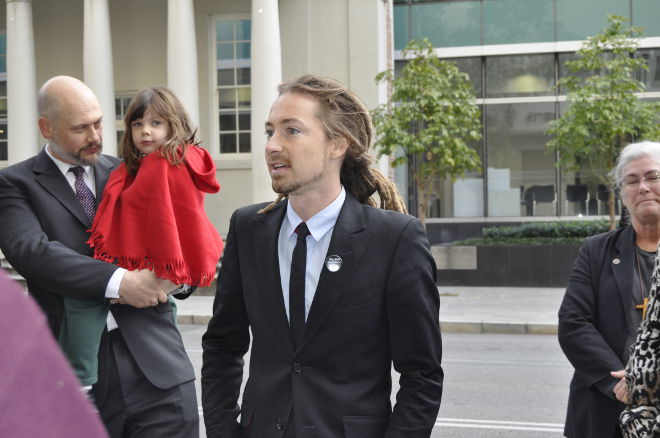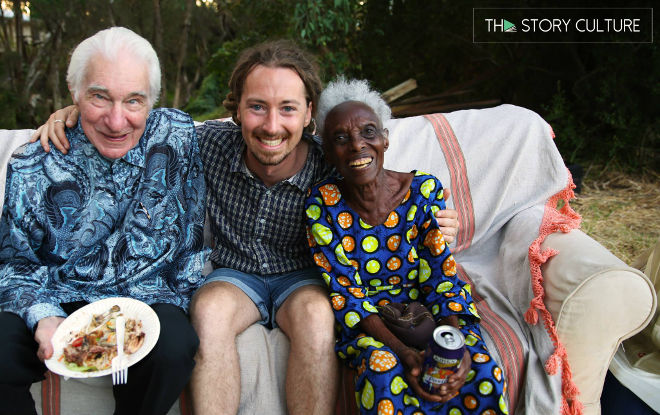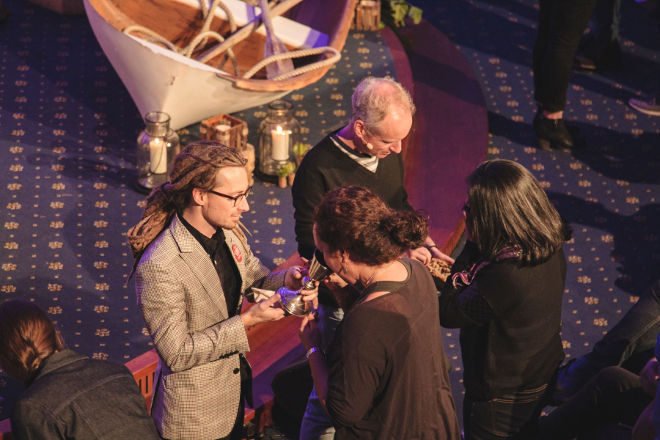An Interview With Jarrod McKenna On ‘Love Makes A Way’, Asylum Seekers And Christian Activism
"Brother Tony Abbott, please listen to Jesus. Let these children and their families and all in indefinite detention go."

If you care about the cause of asylum seekers in Australia, you know there’s not been much to cheer about lately – the government descends further into cruelty, while much of the populace just shrugs.
So when a group of priests and pastors were arrested for peacefully occupying the Sydney offices of immigration minister Scott Morrison in March, praying and demanding the release of kids in detention, it turned a few heads and went a bit viral. When it happened again and again in the following months, it felt like a movement. To date, over 100 leaders from many different faiths have been arrested at Love Makes A Way prayer vigils in politician’s offices all over the country (the PM wasn’t spared; his digs were targeted in May).
The charmingly polite stubbornness with which they’ve taken the government to task has earned many supporters of all persuasions, even if the prayer bit is lost on some of them. Along with other “cranky Christian” activists like Gosford Anglican Church’s Father Rod Bower (he of the irrepressible message board) and rogue Catholic priest and Triple J presenter Father Bob, they’ve been a pain in the conservative arse even an atheist could love.
One of the main minds behind Love Makes A Way is Perth-based radical Christian leader Jarrod McKenna. With his blond dreadlocks, casual vibe and jokes about how Christians are “daggy,” he’s hardly the sanctimonious, Bible-bashing type. But when the subject of human rights and nonviolent resistance comes up, the charismatic McKenna becomes passionate, even evangelical.
And unlike many of his fellow God-botherers, he backs up his beliefs with progressive action. He’s spent years agitating for justice and working on community programs addressing racism and poverty; he’s trained nonviolent activists all over the world; and he and his family live in a community with asylum seekers called the First Home Project.
“We Christians have been jerks,” McKenna confesses. “Please hold us to something that looks more like Jesus”. His conviction is refreshing in a public sphere where religion is usually downplayed. For McKenna, faith and fighting for change go hand in hand.
–
Junkee: How do you connect your activism with your beliefs?
Jarrod McKenna: It’s so sad when the ignorant, hate-filled, fear-mongering stuff gets to brand Christianity, especially when none of it looks like Christ. Bill Maher, who’s an atheist and has said some shocking stuff about Muslims recently, but sometimes gets it right, had this cracker line about how nonviolence was Jesus’ big thing – that [being] into Jesus and not being into nonviolence is kind of like saying you support Greenpeace but you hate whales. It’s just so spot on. Gandhi said: “I like your Christ, I do not like your Christians. You Christians are so unlike your Christ”. But if Christians could have the humility to actually hear outside voices going, hey, why don’t you be more like Jesus, instead of trying to defend ourselves and go “we’ve got the truth and God’s on our side”, I think that a little bit of humility would transform us incredibly.

How did you get your start in nonviolent activism?
JM: [laughs] Well, when I was a teenager I became a Christian, and I figured that was saying yes to [the idea] that God loves me – though I found that hard to believe – and tied to that is trusting that maybe God can love through me. Those kinds of formational experiences have grown into living in a Christian community and working with the homeless and being part of communities that start permaculture gardens and being involved in organising. But for me it was that simple kind of journey — if God is love, then maybe God can love through me. I know that doesn’t sound very theologically impressive or anything.
You’ve trained people for nonviolent protest all over the world – how did your work develop?
JM: I was 21 and I was involved in my first arrestable action at Pine Gap [protesting Australian involvement in the Afghan war], and people asked if I would come and do trainings. And I’d studied the Freedom Movement – what’s popularly referred to as the Civil Rights Movement – and I came in and humbly started doing that alongside other people, and it just kind of grew and grew. Started doing that among high school kids, as well as for organisations like Greenpeace and Rising Tide, and so that just kind of kept growing… So it wasn’t ever like, “I’m going to be an activist trainer, I’m going to be a nonviolence expert,” it was actually, well, I’m working through this stuff to try and live that love I was talking about. Because I guess that’s what nonviolence is for me – it’s what love looks like in practice.
And the American Civil Rights Movement is one of your main influences?
JM: Yeah, yeah, definitely – and we have phenomenal nonviolent leaders in Australia, like [Aboriginal activists] Jandamarra, William Cooper, Vincent Lingiari and Charles Perkins. But my initial influence came through being 18 years old and reading Why We Can’t Wait and then Strength to Love and then every other Martin Luther King book I could get my hands on. And since then have been mentored by people like [MLK associates] Vincent Harding and Jim Lawson… These men’s kindness has transformed my life.
Vincent Harding [said] what we’re doing is not just inspired by [the Freedom Movement], it’s a continuation of it. He dared us to be worthy of that connection. He talks about how we must remember those who went before us, and remind ourselves that we’re connected. That kind of connection lays at our feet a great obligation, and part of that connection is also tremendous possibility.
How did the Love Makes a Way movement actually start?
JM: [laughs] Yeah, to move from the sacrosanct setting of the black prophetic church tradition, to a somewhat less sacrosact setting of over a beer in a pub in a Sydney. Mates like Justin Whelan and Josh Dowton and Jody Lightfoot and Matt Anslow said “now’s the time, we’ve tried everything”. We didn’t think [it] was going to be a movement – we thought it was a once-off action, and we were so surprised to find out that while we were sitting in a cell after being arrested it was trending on Twitter.

Have you had to talk some of your colleagues into these actions or are they kind of queuing up to take part?
JM: Yeah, definitely, people are so keen, and a surprising diversity of people. Our first action in Morrison’s office happened on March 23; it was two weeks after that in Perth that the second action happened. And we had lifelong Liberal voters who sat in Julie Bishop’s office, who sought to get a meeting with her and couldn’t. So here’s a worship leader who’s a lifelong Liberal voter, who as a Christian and as a mum and as someone who believes in a better Australia was saying “please listen to us, we can’t do nothing while these kids are here”.
We’ve had everyone from a 90-year-old nun to a Pentecostal pastor from one of the biggest churches in Australia, to Baptists to Sydney Anglicans to… I mean, it’s almost the only thing we all agree on, is that God doesn’t want these kids in detention. [laughs] Which has been phenomenal.
Have you gotten reactions from the pollies you’ve targeted? Have any of them engaged you?
JM: Definitely, and in fact one of the really interesting things [is that] some of that has been behind closed doors, and some of it has been very public. [Labor] Senator Sue Lines, here in Western Australia, after seeing our action she contacted me – and she’s a big supporter of First Home Project. She said, “saw your action in Julie Bishops’s office, I will invite all the church leaders who sat in her office to come to my office”. And she said “look, I don’t want you to leave, but over a cup of tea and scones, I want to hear your concerns”. And so she invited us all, and then invited me as a pastor to speak at the WA Labor convention with Melissa Parkes… and out of that they were able to get a motion up and support from the Labor right, [saying] that it is time to call for children to be released from detention. And so that will go to the Labor National Convention next year as a proposed policy change.
So there’s been very public kinds of actions like that, but there’s also been the behind-the-scenes things. And even watching how politicians are now prepared for us; they will send out press releases when there’s a group of pastors and priests and nuns and other people of faith sitting in their offices, and [they] will say, well, it’s actually under the Liberal government in 2005 that we released all children and their families. And we’re saying, exactly – please, please, Abbott, please be as decent as John Howard was, and release all children and their families from detention like the Liberal Party did in 2005. Because this isn’t a right/left issue, this is actually a right/wrong issue. And there’s no way that the current detention of, what, 789 children in indefinite detention in any way reflects the Australia that most Australians want to see.
So you think some traction is possible on the issue of kids in detention?
JM: The really surprising thing for us is that it’s not just been traction in this space. The daggy Christians being willing to do this in our neat attire and conservative hymn-singing while we wait for the police to arrive – we heard from the free education protest last week, that part of the inspiration for them in nonviolent protest was actually saying, “well if Christians are doing it, surely we students can do it as well”. We heard from 350.org, the Pacific Islander Christians who blockaded the coal port in Newcastle, and there were two actions in Australia where they occupied offices, and they said, “well if the Christians are doing it with Love Makes a Way, surely it’s time for the rest of Australia to stand up as well”.
And for me that’s the church at its best, when we can actually live what it is to — without demonising those that are actually involved — lovingly call for a more just society. And I’m in awe and sort of thankful that it’s not just getting traction amongst people concerned about refugee rights, but people concerned about the common good in general.

Have there been any uncomfortable or confrontational moments at the vigils?
JM: [laughs] Yeah, sure. These edgy moments, you plan for them, and that’s why so much preparation and workshops have gone into Love Makes a Way’s training. But one of the things that Jim Lawson, who ran the first nonviolence workshop that Martin Luther King ever did, he says that he doesn’t run trainings, he runs an orientation. A training is about an event, but an orientation is about a life of nonviolent struggle. And that’s what we’re seeking to do, it’s not training people for a once-off event, but actually how do you go deep enough to learn in those situations where it’s super awkward, that we can respond with love and humility instead of hostility. In many actions, police have shaken our hands before arresting us.
The police treat you differently because of how you’re being?
JM: We talk about it in terms of double-victory nonviolence. And it comes from a Martin Luther King quote, where [he] talks about that we will not only win our freedom, but we will win you over in the process, and our victory will be a double victory. And every action, our prayer, and all the workshopping and preparation we do, is so that people not only seek to win freedom for these children and their families, but seek to win over the police and the staff that we’re engaging in the process.
Whether it’s Muslims or refugees or gay and lesbian people or people with disabilities or the poor, society still today tries to hide the corpses of those we call “them”.
So this isn’t about how righteous we are, this is a confession that we as church leaders, we’ve done so little while this has continued for so long, and we’re here to actually, to use the kind of Biblical word, repent of our apathy in the face of this kind of injustice. When [a colleague] was having his fingerprints taken in the cop shop, the old police officer who was doing this said, “you make sure to get the press and everything when you go to court, because the damage we’re doing to these kids means that coppers will be fingerprinting them in 10 years time, like we’re fingerprinting you, and unless you’re successful, these kids are going to be a problem”.
One cop said, arresting us, “if this wasn’t my job, I think I’d be joining you, so please know this isn’t personal” [laughs]. That for me is success.
Most Australian leaders identify themselves as Christians. What’s the disconnect with human rights?
JM: Somehow it’s very easy to have talk of human rights via lips, while we participate in what the Bible names as the most ancient of human wrongs with our lives. The most ancient of human wrongs is – to enter into those early stories – is that Cain killed his brother [and tried to hide his corpse from God], and that’s the first act of founding a civilisation. And that act of scapegoating, of having societies who participate in that ancient wrong, in the name of nationalism – in the name of safety, in the name of human rights – we can build a facade behind which we hide the bodies of “them” to make an “us”.
And the biggest problem with our talk of human rights is that it’s often just talk, while we participate in this ancient human wrong, and it goes to the heart of the Christian story…And so for Christians there needs to be this critical approach, where we say that in the name of order, in the name of justice, in the name of peace, in the name of everything that’s good – we killed God. And whether it’s Muslims or refugees or gay and lesbian people or people with disabilities or the poor, society still today tries to hide the corpses of those we call “them”.
It’s very easy for politicians to say “I’m Christian”; it’s very hard to be confronted by a Christ whom we realise that we crucified. And yet he’s given us a shot at living his love, and we need more Christian leaders who are Christlike, who don’t just have human rights on their lips, but are refusing to participate in that most ancient human wrong of scapegoating.
On the other hand, you’ve gotten a lot of support from nonbelievers – typical comment: “I’m an atheist, but I love what these people are doing”. So what do you think it’s saying to those who aren’t interested in the religious side of it?
JM: I think most people are intrigued with Jesus. And when we Christians confess to being jerks, and then seek to live in a way that’s more like Jesus, I think that’s actually something that’s attractive to people. I think there’s something captivating about raw compassion when it’s in the flesh. To use Martin Luther King’s words, “unarmed truth and unconditional love”, when they’re embodied, have a power that, regardless of whether you’re a person of faith or no faith, there’s something intriguing about that.
If you could say one thing to Tony Abbott about kids in detention, what would it be?
JM: I think I’d say, brother Tony, please listen to Jesus. Let these children and their families and all in indefinite detention go. I don’t mean that in ways that are a cheap shot, it actually hurts to say that, for me as a Christian and as a pastor to take seriously Jesus’ own words. He says, “I was a stranger” – or the Greek can be translated “alien,” or “outsider,” basically, “refugee” – “I was a stranger, and you welcomed me”. That is to say that the transformation of God is locked up in how we respond to these people that come to us, and to say no to the refugee is to say no to our transformation. And no doubt I’m just as problematic as Tony Abbott, and just as in need of Christ, so him being a brother isn’t based upon how good we are.
So I appeal to the best of the tradition that he claims and that I claim, and say, brother Tony, please listen to Jesus and let these children and their families go.

